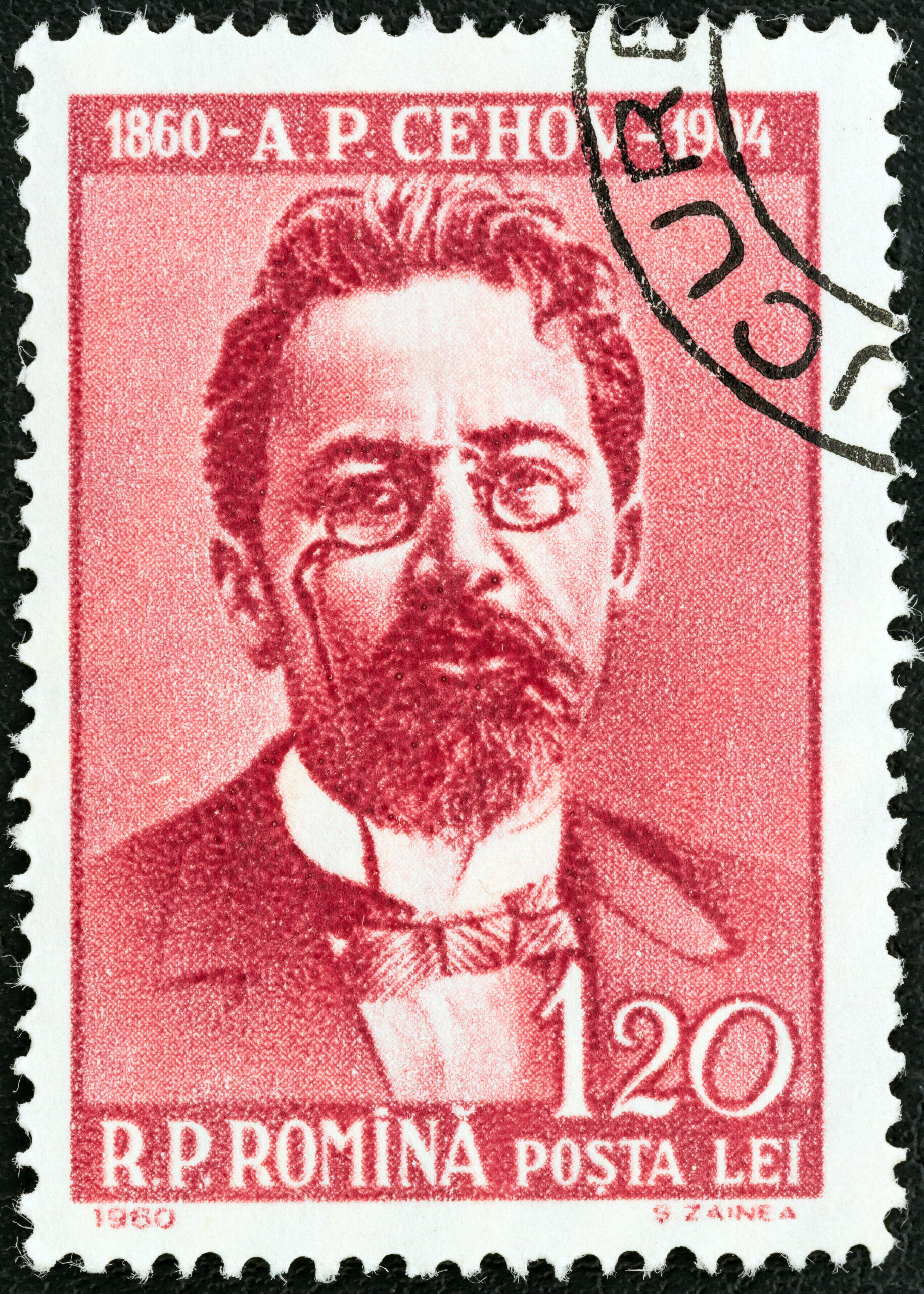November 20th, 2022
CHEKHOV’S DOCTORS a Book Review by Jim Vogele
Chekhov’s Doctors, A Collection of Chekhov’s Medical Tales by Anton Chekhov, ed. Jack Coulehan (Publisher: The Kent State University Press, 2003, ISBN 0-87338-780-5
The Author: Dr. Chekhov
As many physicians know, Anton Chekhov, the Russian-born author, playwright and story-teller, was also a doctor. He accomplished much in his brief life, from the late 19th century into the early 20th century (1860 – 1904). Sadly, Chekhov died at age 44 of tuberculosis. Among his many accomplishments, in addition to the plays for which he is perhaps more renowned, are the short stories, still read over a century later. In the Kent State University Press publication of this volume of Chekhov’s Doctors, a fine addition to the “Literature and Medicine Series #5,” all of the short stories feature a doctor as protagonist or main character. In these stories, the reader experiences the writing of a master student of human nature.
Chekhov lived during turbulent times. Serfdom in Russia was formally abolished in 1861 (slavery in Russia had ceased earlier in the 1700s), but the process was tortuous and many citizens of lower socioeconomic status, as well as nobles, were financially strapped if not impecunious. While Chekhov did not live to witness the Russian Revolution, he lived during a tumultuous period. Both class conflict and personal conflict figure prominently in many of the pieces Chekhov’s Doctors.
Chekhov’s stories include portraits of physicians both serious and pompous (see “The Intrigues” for an example of the latter) as well as a number of medical students (“Anuyta” and “A Nervous Breakdown”). Chekhov himself was indeed still a medical student when he began writing and publishing short stories. As one will learn in any biography of Chekhov, he ultimately earned a living through literature, while practicing medicine largely on behalf of the poor and in the interest of public health. As Jack Coulehan — the fine editor of Chekhov’s Doctors — notes in a succinct summary of Chekhov’s education entitled, “The Education of Doctor Chekhov,” published in 2018 in The Hektoen International, A Journal of Medical Humanities, “Chekhov put great emphasis on what today we would call the social history and clearly practiced narrative medicine long before ‘narrative medicine’ was invented.” While Chekhov may have stated that medicine was his wife and literature a mistress, it was literature that “paid Chekhov’s bills.” Id. https://hekint.org/2018/03/20/education-doctor-chekhov/
The Chekhovian Doctors
Whether short, like a “Doctor’s Visit,” or longer, such as “Ward No. 6,” Chekhov’s stories featuring physicians are deeply moving despite often focusing on the small, telling details of daily life in 19th century Russia. One point that is obvious in Chekhov’s Doctors is that most of the physicians in Chekhov’s stories are male (an exception is Dr. Marfa Petrovna Petchonkin, a homeopathic physician, in “Malingerers” and Vera in “Excellent People”).
Ahhh, Russia, a country that has produced so many great artists and lasting works of art – in drama, dance, and literature. Even in these trying 21st-century times, we cannot and certainly should not give up on Russia, and the Russian people. As with most world history, Russian history is fascinating and complex (very complex) and a survey of widely-available online sources makes for interesting reading. Just as the United States was pieced together over a few hundred years in a process that included much that is arguably regrettable in historical perspective, Russia has seen its share and more of struggle, of the zeniths and nadirs of history unfolding on a continental and global scale.
Not surprisingly, class conflict features prominently in many of Chekhov’s stories. A prime example is “The Princess,” in which an elderly doctor deigns to speak his mind when he encounters his ex-employer, Princess Vera Gavrilova, in a monastery and the Princess asks for his frank opinion concerning her shortcomings. The doctor gives her a piece of his mind, in the form of an honest recitation of her various vanities and cruelties. The Princess is shocked. But, alas, the physician apologizes the next day.
Chekhov’s short’ stories, it is said, ushered in an entirely new era of the short story. You are unlikely to find in Chekhov a nicely rounded narrative driven by plot with a twist at the end a la O’Henry. Rather, you will typically find a dispassionate narrator, presenting life as it is, and oftentimes without judgment (which doesn’t mean that as a reader one will not arrive at one’s own judgment about a Chekhovian character or story). It is apparent that a dispassionate approach might befit a physician, called upon to provide diagnosis and treatment to a wide range of patients from all walks of life. And yet, the doctors in Chekhov’s tales are as susceptible to the turbulent seas of emotion as are all doctors, all humans.
While it may sound like an oxymoron, I see in Chekhov’s short stories both a dispassionate and a compassionate point of view. In relating discrete details of his characters’ lives, Chekhov displays remarkable compassion in the story-telling. He is not specifically instructing or guiding the reader to a particular conclusion or judgment, but rather telling the story for the reader to make of it what the reader will.
Whither the Chekhovian Connection to Physician Contracts?
Before law school, I received my B.A. in English Literature. Like many a literary dilettante, I had known Chekhov primarily based on his two later plays, Three Sisters and The Cherry Orchard. I had also many years ago acquired a collection of Chekhov short stories, but had read only a handful. When I created this website to accompany my practice niche of providing legal advice and representation regarding physician contracts, including specifically physician employment contract review and consultation, I encountered the collection, Chekhov’s Doctors. I bought the book this past summer and read the first few stories, only to have my reading interrupted by a trial in federal court in Portland.
As trials are wont to do, this trial monopolized my time for several months; and hence my reading of Chekhov was interrupted during this period. I tried to fit in the reading of a few stories during trial preparation, but was reminded, in doing so, that reading Chekhov demands pretty serious concentration. Chekhov’s short stories are vastly entertaining intellectually, but, or perhaps for that reason, I find them to be best read in the quiet hours, later in the evening, with a glass of wine or cup of tea, which seems to enhance the experience. In any event, with or without a beverage, the lyrical writing and 19th century Russian setting are best experienced with one’s complete focus. I shudder to think, although there may be some truth in the thought, that I, like many 21st century souls, have allowed the nascent erosion of my ability to focus on longer-form fiction. And short stories are not even long-form prose! Reading Chekhov stories is, in short, a splendid antidote to the diminishment of one’s powers of concentration induced by excessive screen-time and the cursory perusal, or scanning, of textual ‘sound bites.’
Here, I should note that the esteemed Robert Coles of Harvard University, a scholar, teacher, and psychiatrist, wrote a Foreword for Chekhov’s Doctors. Not surprisingly, perhaps, I was an enthusiast of the interdisciplinary approach to legal education when I was at Harvard Law School; indeed, I took as many courses outside the Law School – all literature courses – as I could while still garnering the necessary law-school classroom credits needed for a Juris Doctor degree. One course that I would have loved to take, yet alas was unable to take, was Robert Coles’s course on “Dickens and the Law.”
As Editor Coulehan observes in the essay mentioned above, “The Education of Doctor Chekhov”: “Chekhov put great emphasis on what today we would call the social history and clearly practiced narrative medicine long before ‘narrative medicine’ was invented.”
What I can say is that narrative medicine has been a ‘thing’ for some time, I confess I hadn’t given it much thought until a few years ago. In a recent article about Rita Charon, the pioneer of narrative medicine at Columbia, it is noted that a doctor typically gives a patient about 11 seconds before interrupting. Eleven seconds! https://www.vox.com/the-highlight/2020/2/27/21152916/rita-charon-narrative-medicine-health-care
As an employment attorney who has heard countless stories of problematic workplaces, including unlawful employment law practices, I do understand the instinct to interrupt. We are working with limited time, limited resources, and have to make the best use of our time. Based on decades of employment law experience, I know the issues that will get me to the bottom (or so I think) of an employment law scenario
And yet, I also understand that clients often have a need to tell their story. Indeed, one of the hallmarks of the mediation process in law is that it can, and ideally should, allow the client to tell their story in a setting that is not only quicker, but also significantly less stressful than is the trial process.
Today, physicians have so many demands upon their time – with electronic record-keeping obligations, with wRVUs and utilization reviews and quality metrics . . . not to mention the daunting burdens of educational loans – that, as in the legal profession, it can be challenging to carve out the time for sustained engagement with patients and clients. Nonetheless, it remains important for physicians (and lawyers) to listen carefully to their patients (and clients) and, within the realities of modern healthcare (and law), to communicate as fully as possible with those we serve. Chekhov may not have so much to say about being a doctor or the practice of medicine per se, but the relevance of close observation, of narrative story-telling, remains as relevant now as ever.
Conclusion
The question remains: Is Chekhov relevant these days, for example, (1) to an oncology fellow contemplating a California physician contract; (2) to an anesthesiologist considering a Washington physician contract; (3) to a family practitioner presented with a Montana physician contract; (4) or to a non-invasive cardiologist reviewing an Oregon physician contract?
I believe so, albeit not because one will learn much about medicine per se from short stories written in the 1880s and 1890s. On the topic of medicine per se, as editor Jack Coulehan wrote in the Hektoen International, “[O]ne might argue that Chekhov had far less material to learn [than do contemporary medical students and healthcare practitioners]. The discoveries of Koch and Pasteur had just barely penetrated Russian. Mare’s milk was still a popular treatment for tuberculosis. And no one had ever heard of a hormone.”
Yet one reads literature for reasons other than to learn the science of medicine or the rules of law. There is an art to medicine, and Chekhov understood this. Listening closely to one’s patients, as in the practice of law to one’s clients, may well make us better practitioners. Thus, I would argue that Chekhov’s Doctors remain as relevant as to ever to the curious physician reader, as they were to this curious lawyerly reader.



